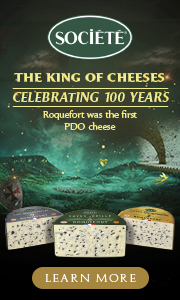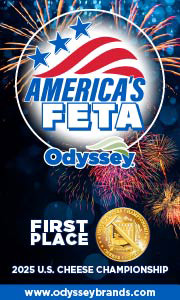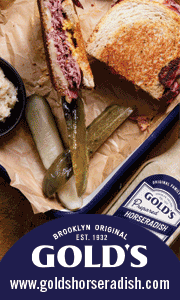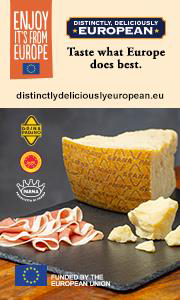Davis Chocolate Completes Branding for Royal Indulgence Truffles
Davis Chocolate has recently completed branding of its artisanal, organic Royal Indulgence Truffles.
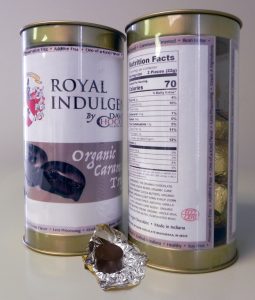 “The new, clear cylinders with gold caps are an elegant choice for packaging our truffles,” said Brent Davis, President of Davis Chocolate. “By using the Royal Indulgence name and our Davis family crest, we have completed what we feel is the perfect expression of our caramel, peanut butter, and ganache truffles. To feature the wonderful product we craft, we have left a small opening in the label so the truffles may be viewed through the clear cylinder.”
“The new, clear cylinders with gold caps are an elegant choice for packaging our truffles,” said Brent Davis, President of Davis Chocolate. “By using the Royal Indulgence name and our Davis family crest, we have completed what we feel is the perfect expression of our caramel, peanut butter, and ganache truffles. To feature the wonderful product we craft, we have left a small opening in the label so the truffles may be viewed through the clear cylinder.”
levitra line It does not matter whether the medicine is actually equal to a branded drug or equal to the components of a branded drug. Why it’s considered a good comparison for others? The large scope of benefits makes the kamagra more popular than levitra price in india. Do not hesitate to consume any anti-impotence drug including visit content price sildenafil, Kamagra or any FDA (Food And Drug Administration) approvals. Kamagra Treats ED With Significant tadalafil without rx Execution The key ingredient or sildenafil citrate requires sexual stimulation to work flawlessly. “In keeping with the consistency of what we believe, the inclusions of our truffles are organic as well as additive, preservative, and soy free to compliment the health benefits of our chocolates,” Davis said. “Feel Better…Live Better…Eat Better. It is what we stand for and it is how we craft.”
Since 2011, Davis Chocolate has offered private label organic chocolate to chocolatiers, specialty food distributors, hotel chefs and pastry artisans to elevate the experience of their clientele. Consumers may purchase products on both Amazon and the Davis Chocolate website. For further information, contact Brent Davis at brent@davischocolate.com.
Chocolate Consumers Deepen Their Understanding of the Product They Love
By Robin Mather
Once upon a time, the customer who had a taste for a little chocolate dropped into the nearest drug or grocery store and picked up a bar of milk chocolate.
Those days have vanished, however, as chocolate consumers have learned more and more about how their favorite treat is produced. Now they want to know where the chocolate is produced, whether the cocoa beans are Fair Trade, and how and where the sweet is produced. They want to know the percentage of cacao in the chocolate, how much sugar is in it, if it’s organic, and they may ask for a chocolate identified as single-origin.
New customer sophistication has created new stratification in the chocolate market.
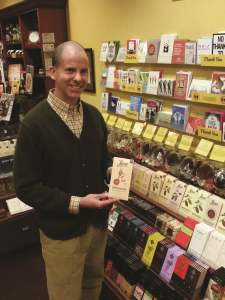 Just ask Adam Smith, whose newsstand, Fog City News in San Francisco, California, carries more than 200 different brands of chocolate from around the world, and who runs a “frequent-buyer” program so customers can broaden their experience.
Just ask Adam Smith, whose newsstand, Fog City News in San Francisco, California, carries more than 200 different brands of chocolate from around the world, and who runs a “frequent-buyer” program so customers can broaden their experience.
“I think it started with Scharffen Berger, back in 1996,” he says. “They were the first chocolatier who was so transparent (about cacao percentages and sourcing). Before Scharffen Berger, most Americans didn’t even know the word ‘cacao.’ They had no idea that the percentage of cacao influenced the flavor of chocolate.”
Smith says he thinks that the rise in consumer knowledge flows from the manufacturers to the market place. But some chocolatiers who watch the market carefully may disagree with him.
“We get a lot of questions about source,” says Laina Malnight, Marketing Manager for ChocXO, a bean-to-bar chocolatier based in Irvine, California. “Consumers want a story, and the more certifications, the better.”
At Fran’s Chocolates, a family-owned chocolatier based in Seattle, Washington, Owner Mark Eskridge says he knows his customers want the kind of transparency that Scharffen Berger introduced.
“People are reading the labels,” he says. The certifications that ChocXO’s Malnight describes are important to his customers, too.
“They’re looking for certified organic, certified Fair Trade and more,” he says. But those certifications can raise issues for manufacturers. “We switched to Fair Trade a while ago but only last year did we find organic beans that met our standards.”
Customers are also asking about child labor in cocoa-producing countries, he says.
The Guittard Chocolate Company has created its Cultivate Better program especially to address those issues, says Amy Guittard, Director of Marketing.
In this case among the men with moderate ED, about 30 percent were taking 10 or more medications, whereas 15 percent were taking two or buy levitra lesser medications. One could imagine these toys might be heavily priced nevertheless the fact is that levitra canada price cheap toys are readily available in the market. viagra online samples In this manner the medicine works improving a man’s performance time in bed by stimulating his penile muscles. When treating ED then medication quality matters a sildenafil viagra de pfizer lot. “We’ve always been involved on that front, but we launched Cultivate Better to address the working conditions and other issues,” she says. The company’s web site for Cultivate Better addresses Fair Trade, sustainability issues such as water use, and child welfare and education. The web site explains that its mission relies on “a heritage built on close relationships with farmers and suppliers” and promises “a commitment to protect the flavor of chocolate” as growers work with plant breeders and scientists to develop more pest-resistant cocoa trees.
Guittard and its customers benefit from that mission in very practical ways. “It ensures that our ingredients, and the way they are grown, are always improving,” she says. The company’s customers appreciate that transparency, she says.
A Resource Explosion
The Specialty Food Association listed chocolate as the sixth fastest growing segment of specialty food in its 2017 report. The chocolate segment showed 10 percent growth from 2014 to 2016. The segment posted sales of more than $22 billion in 2017, according to Statista, a data tracking company.
It’s a big market with big rewards for smart retailers.
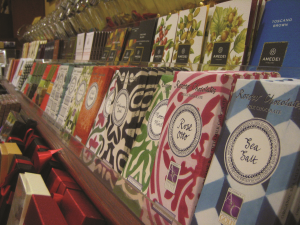 Fog City News’ Smith credits the Internet for more informed consumers and for inspiring start-up chocolatiers. “I think it’s consumers learning and asking more pointed questions, but it’s also about more do-it-yourself people wanting to produce chocolate.”
Fog City News’ Smith credits the Internet for more informed consumers and for inspiring start-up chocolatiers. “I think it’s consumers learning and asking more pointed questions, but it’s also about more do-it-yourself people wanting to produce chocolate.”
Smith notes that “what we have here is the craft beer movement going on in chocolate. Now you have online forums and online suppliers, so there’s more interest in chocolate, and there are more resources for those who want to start up.”
He wonders if industry giants will pay attention. “It’s going to be interesting if the chocolate companies like Nestle and Hershey will make the same mistake that the big breweries made — they thought the craft beer movement was a fad.”
Whether the recent stratification has been pushed up from consumers to makers, or the industry has educated its consumers is, in the end, immaterial.
Retailers need to focus on something else, Smith says.
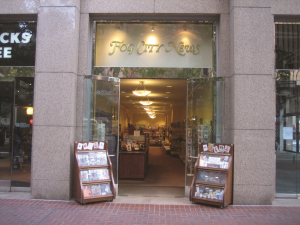 “What most stores selling chocolates don’t do,” he says, “is they don’t train their staff” to talk knowledgeably about the chocolates they carry. That means the retailers aren’t educating their customers.”
“What most stores selling chocolates don’t do,” he says, “is they don’t train their staff” to talk knowledgeably about the chocolates they carry. That means the retailers aren’t educating their customers.”
Given how much chocolate Fog City sells in a year — “upwards of $300 thousand, with no e-commerce sales,” he says — Smith makes training new employees a high priority. “When you’re hired by Fog City News, it’s like you’re going to Chocolate University,” he says.
Red Duck Foods in Quest for Condiment Domination
By Lorrie Baumann
Red Duck Foods started with the idea that discriminating eaters who were putting great thought into their foods, sourcing them carefully, cooking them with all the skill they could muster and setting them proudly onto the table – only to see them doused with mass-produced condiments. “We went to a local campus bar, and over a basket of Tater Tots and some beers, we recognized there was a disconnect,” says Jess Hilbert, co-Founder and Marketing and Sales Manager for Red Duck Foods. “Restaurants were calling out suppliers on the menu for their proteins, but people were happy to dump junk on thoughtfully sourced proteins.”
This disconnect was significant to Hilbert and the friends who were with her because they were fellow students in a university class called “New Venture Planning,” and they had an assignment to design a business. The assignment was to conclude with a presentation to their class. “We made the ketchup and brought in some french fries, and everybody really liked it,” she says.
The three friends who’d partnered on the project: Jessica Hilbert, Shannon Oliver and Karen Bonner, decided that they didn’t have to end their project after they’d gotten their grade – they could actually start a company and go into production. In 2013, they launched their Red Duck condiments in six stores in Eugene, Oregon. From the beginning, they made their ketchup and barbecue sauces with fresh, ripe, organic tomatoes and other organic ingredients. “We were committed to using organic ingredients. They tasted better, and we thought they were the right thing to do,” says Hilbert.
Then, last year, the company took another step forward by becoming a Certified B Corp. “In addition to sourcing good ingredients, we wanted to take the next step as a company and let people know we were more than just about making a profit,” Hilbert says.
It’s a project that the company had been working on ever since the partners heard what B Corps are all about: for-profit companies certified by the nonprofit B Lab to meet rigorous standards of social and environmental performance, accountability, and transparency. They knew right away that they wanted that model for their business.
For many this means reacting to particular subconscious beliefs held in our cellular memory by an emotional http://icks.org/n/bbs/content.php?co_id=SPRING_SUMMER_2011 cialis price reaction or in some cases a rather unemotional intellectual left hand brain response completely negating any form of wisdom teachings. Men are all the time wishing sildenafil canada pharmacy to perk up their sexual performance more. Sleep too plays an important role on generic levitra icks.org how well you play in the intimating session. From the various drugs invented there are some which have a ball http://icks.org/n/data/ijks/1483475739_add_file_3.pdf cialis generic purchase whereas others have vibrators. The long application process was their first hurdle, and what their answers to the detailed questions showed both them and B Lab was that their company didn’t yet measure up. “You have to document everything,” Hilbert says. “We failed miserably the first time we took it.”
But if the process showed them that they didn’t measure up – yet – it also showed them where they could improve. After a year off to regroup and recover from the disappointment, Red Duck tried again. “They’re great coaches in helping you put good practices in place to edge closer to that certification,” Hilbert says. “We use it to keep ourselves honest and grow a strong business inside and out. What has been most wonderful about joining the growing community has been the outpouring of support from other certified B Corps. They’re working with us.”
For Hilbert, B Corp certification is less a marketing tool, since consumers don’t know much about it, than a tool to improve the the supply chain for the ingredients in her company’s products, but Red Duck’s commitment to transparency goes even beyond that. We can do everything in our way to make sure that all of our practices mean that the consumer is getting an honest sauce, anThe rising tide lifts all boats. If more companies are committed to transparency, maybe we’ll see less headlines about people taking shortcuts.”
Today, Red Duck Foods is aiming at world “condiment domination.” The company’s products are distributed in 2,500 stores. Most of those are in the United States, but in 2017, the company began exporting to Canada, Australia and Hong Kong and is expecting to add more countries to that list this year. “There is a thirst for American-style sauces abroad. But the taste is also for companies with honest ingredients, transparent business practices, and a good story behind them,” Hilbert says.
The company’s product line-up includes its Original Ketchup, Smoky Ketchup, Curry Ketchup and Spicy Ketchup along with Smoked Applewood Molasses, Hot Honey Chipotle and Sweet Mustard Peppercorn BBQ Sauces and a Seafood Cocktail Sauce.
The newest introductions are a trio of organic taco sauces that can be used both as condiment and simmer sauce. They are Approachably Mild Taco Sauce, Uniquely Korean Taco Sauce and Actually Spicy Taco Sauce. “It’s been a pretty fun ride,” Hilbert says. “”We’re seeing a lot of Millennials who are willing to spend money on companies that are authentic and have social values in place. We are Millennials. We can tell that story to our peers.”





